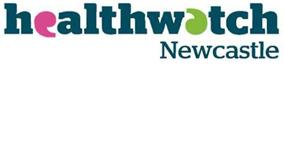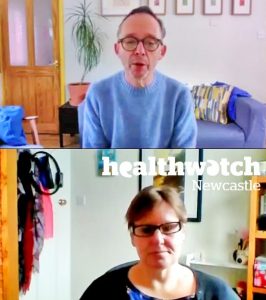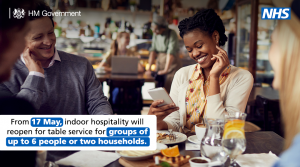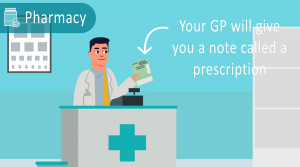Healthwatch Newcastle Newsletter – 19 May 2021

You say, we did
Mr R told us
Mr R called us because he was having difficulties accessing medication for a personality disorder from his GP practice.
We did
We encouraged Mr R to speak to the GP Practice Manager to discuss the issue. However, when Mr R tried this he could not get through to the Practice Manager and was unable to leave a message. We offered to call Mr R’s practice on his behalf, which he agreed to.
We also explained the process on how to raise issues with NHS services and organisations that can support him, such as the Patient Advice and Liaison Service (PALS) and Independent Complaints Advocacy (ICA).
As a result of his feedback
Talking to the practice on Mr R’s behalf, we were informed that patients are not barred from speaking to the Practice Manager and messages can be left. We requested a call back for Mr R at the earliest opportunity because his issue involved access to vital medication. The practice called him back the same day and he received his medication two days later. Mr R told us he was surprised and very pleased to get access to his medication. Also, he now knows how to raise issues with his GP practice and how to seek support from PALS and ICA.
We can help
We can give you free, independent and confidential information about local health and social care services. We can also help you make decisions on what to do if you are unhappy with care or treatment or that of a friend or family member. Please don’t hesitate to get in touch if you need support like Mr R via Freephone 0808 178 9282 or www.healthwatchnewcastle.org.uk/just-ask
Can social prescribing help me?
We recently spoke to coach Mark Read about social prescribing in Newcastle upon Tyne.
Social prescribing is a different approach to tackling physical and mental health. You can see a social prescriber through your GP and be easily referred to link workers from a wide range of local agencies including pharmacies, hospital discharge teams, fire service, police, job centres, social care services, housing associations and voluntary/community organisations.
Watch the interview on our YouTube channel at https://youtu.be/wan8kPYmTaM
COVID-19 update
Symptoms
Most people with COVID-19 symptoms have at least one of these:
- A high temperature
- A new, continuous cough
- Loss or change in sense of smell or taste
Some people with COVID-19 do not have symptoms but can still infect others. This is why everyone is advised to get tested regularly.
Read more on testing at www.nhs.uk/conditions/coronavirus-covid-19/testing/regular-rapid-coronavirus-tests-if-you-do-not-have-symptoms
Easing of restrictions
Some coronavirus restrictions have eased across England from Monday 17 May. Groups of up to six people or two households can now meet indoors. People can attend indoor and outdoor events, including live performances, sporting events and business events. Indoor hospitality venues such as restaurants, pubs, bars and cafes can reopen.
Read the current guidance at www.gov.uk/coronavirus
Visiting a care home
Care home residents can now have five named visitors for indoor visits. Residents also have more opportunities to leave their care homes to go on walks or visit a friend or family member’s garden and not self-isolate on their return.
Find out more at www.gov.uk/government/publications/visiting-care-homes-during-coronavirus/update-on-policies-for-visiting-arrangements-in-care-homes
Vaccination programme
At the time of writing, vaccinations are available to people aged 36 and over or who will turn 36 before 1 July 2021. Pregnant women will be directed to centres offering Pfizer and Moderna vaccines.
You can choose to book your vaccination appointments at a larger vaccination centre or pharmacy or wait to be invited to go to a local NHS service.
Book online at www.nhs.uk/conditions/coronavirus-covid-19/coronavirus-vaccination/book-coronavirus-vaccination or call NHS 111.
Get up-to-date information about the vaccination programme at www.nhs.uk/conditions/coronavirus-covid-19/coronavirus-vaccination/coronavirus-vaccine
National Smile Month
From 17 May to 17 June 2021 the Oral Health Foundation is raising awareness of the benefits of having good oral health. Brushing your teeth twice a day for about two minutes with fluoride toothpaste is the best thing you can do to keep your teeth and mouth healthy. If plaque isn’t removed, it continues to build up and can lead to several oral diseases such as tooth decay and gum disease. Over time, this can lead to tooth loss.
We know that people may be experiencing difficulties accessing dental services at the moment. Due to the pandemic, the number of appointments dental practices can provide has significantly reduced. The current advice to patients is:
- Please only visit your practice if you have an appointment and phone to book an appointment only if essential — dentists are currently prioritising the vulnerable or those with the most urgent need.
- Appointments for some routine treatments, such as dental check-ups, may have to be delayed for a later date.
- If you develop an urgent dental issue telephone your regular dental practice (or any NHS practice if you don’t have a regular dentist) for advice on what to do next.
- Dental issues will be triaged first over the telephone. If the issue needs face-to-face care, you will be given an appointment either with the practice or at an urgent dental care centre and advised to attend as long as you do not have any COVID-19 symptoms.
- If, after telephone triage, the clinician decides the issue is not deemed urgent, you may be advised on how to self-manage the dental problem. You will be advised to make contact again if your situation changes/worsens.
- Only ring NHS 111 out of hours when your dental needs cannot be met by self-care and cannot wait until your practice is open to contact them for advice.
Read more on looking after your teeth at www.dentalhealth.org/how-to-clean-your-teeth
Ensuring our patients are safe: Meeting the needs of our local population
Wednesday 9 June, 2pm to 4.30pm
The Academic Health Science Network’s (AHSN NENC) goal is to ensure that the North East and North Cumbria has the safest and highest quality health and social care system.
AHSN NENC invites you to an online event to help shape these plans. There are five national workstreams set out in a Patient Safety Collaborative specification, including:
- Early detection and management of physiological deterioration.
- Safety of maternity and neonatal care.
- Medicines’ safety.
- Mental health safety.
- Adoption and spread of four identified interventions (Emergency Laparotomy, Tracheostomy and COPD Discharge Bundles and the Development of an Improvement and Innovation Pipeline).
If you have an interest in one or more of these areas, please attend to understand more about the work.
Register at https://tinyurl.com/yk9x35u5
Newcastle research study on Type 2 diabetes
Newcastle University research has shown that Type 2 diabetes can be reversed by weight loss. Professor Roy Taylor’s team is now testing whether this is also possible for non-obese people with Type 2 diabetes. The team is looking for two types of volunteer.
People with Type 2 diabetes:
- Less than six years duration
- Non-obese (BMI <27)
- Aged 20-70 years
This involves regular visits to the Newcastle Magnetic Resonance Centre over one year.
People without diabetes or prediabetes:
- Without diabetes or prediabetes
- With no first degree relatives with diabetes
- Non-obese (BMI <27)
- Aged 20-70 years
This involves a single morning of studies at the Newcastle Magnetic Resonance Centre.
Find out more at www.ncl.ac.uk/magres/research/diabetes/newstudy-retune
English for Health
English for Health is a series of online videos and workbooks to help people who don’t have English as a first language to understand the NHS.
Involve North East developed the resources with support from local charity JET (Jobs, Education & Training). The English for Health videos cover:
- An introduction to the NHS
- How to use a GP
- How to find the right help
Each video ends with a Q&A session to help consolidate learning. The accompanying workbooks contain all of the relevant information and links to other resources.
Access the resources at www.involvene.org.uk/english-for-health
Free mental health support for anyone aged 26 or over
An NHS service was recently launched for anyone aged 26 or over living in Newcastle or Gateshead. ‘Qwell’ is an online emotional wellbeing platform and complements the range of local mental health services already available.
Find out more at www.qwell.io
Children and young people aged between 11 and 25 in Newcastle or Gateshead can access free professional counselling and support online.
Find out more at www.kooth.com
Breathing Space for survivors of gender-based violence and abuse
Breathing Space provides practical and emotional support to survivors of gender-based violence and abuse. The app can be used on any device, including a computer browser. As many perpetrators of abuse monitor website use or phones, the app and website are designed so you can exit information quickly to a website of your choice, such as BBC weather.
It provides information on where to get immediate help, financial, housing and legal support and much more.
Find out more at www.breathingspace-ava.org.uk
This newsletter in other formats
We’re currently unable to provide paper copies of this newsletter. If you would like a version you can print out yourself, you can find copies of all our recent newsletters at www.healthwatchnewcastle.org.uk/about-us/resources
If you need this newsletter in another format please get in touch by emailing info@healthwatchnewcastle.org.uk or phoning Freephone 0808 178 9282.





